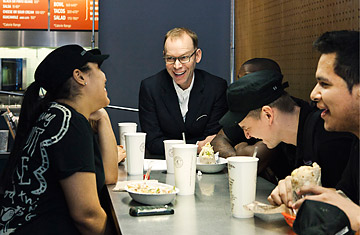
Steve Ells in New York City with Chipotle employees, who are hired based on 13 characteristics, four of which basically mean happy.
(3 of 6)
When Ells couldn't persuade his tortilla-warmer manufacturer to make a better machine, he hired some electrical- and mechanical-engineering friends to design a faster one that heats evenly and gives the tortillas a slight puff. His friends also made him new planchas. And an egg cooker that he believes will make a fortune, even though he's not going to use it because--despite some experimenting at one airport that demanded that all the restaurants in the terminal serve breakfast--he, of course, decided that Chipotle doesn't do breakfast.
Another way Chipotle is different from fast food is that the people who work at its restaurants actually cook--which means some locations are better than others. In the morning I spent in a Chipotle kitchen, my co-workers were chopping lettuce, dicing onions, even pouring oil slowly into a blender for the salad dressings they make twice each day. No one lasts very long at Chipotle without acquiring fairly good knife skills. (There's a good reason everyone wears chain-metal gloves when they cut.) There's no freezer, so ingredients are delivered several times a week. Employees have to adjust recipes on the fly, depending on how big the avocados are or how hot the peppers are at different times of the year. When each batch of guacamole is made, all the employees have to taste it to see if it needs more lime, salt or cilantro. "We've got to be the only fast restaurant that tastes," Ells says. "What are you going to do to taste a Big Mac? Taste a squirt of that sauce that comes out of those guns? No one made it! So they're not going to taste it."
Ells knows a lot about McDonald's because in 1998, he wrote to its executives and asked them to buy a stake in his company so it could expand from about 15 locations to several hundred. They said yes, and McDonald's eventually became the majority owner. After eight years, he asked them for his company back. McDonald's divested and made $329 million on the deal. He says he learned a lot from McDonald's--mostly what not to do. Chipotle doesn't franchise; that way it not only grabs each restaurant's profit but also can promote people and keep them in the company. There are no dollar menus, no coupons, no employee name tags, no one asking you if you want to add fries. Though Ells says he gained a lot from his relationship with McDonald's, his animosity toward its system is clear. It was because of his experience with the company that he decided to build open kitchens so people could see where their meal is coming from. When I ask him if he learned anything else from his time there, he adds this: "Clowns are scary f---ers."
